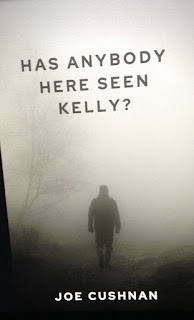Has Anybody Here Seen Kelly?
In Search of My Father
Written by Joe Cushnan
Edited by Averill Buchanan
Word Count: 46,000
Here is a taster from a memoir about my father, John Cushnan from Belfast who vanished for 22 years (1960 to 1982) and resurfaced, with a reinvention of his background, as John Kelly from Derry.
Enquiries to joecushnan@aol.com
Short extract from part of the Prologue
The film I Never Sang For My Father (1970), starring Gene Hackman and Melvyn Douglas, is a powerful human story, beautifully scripted and performed. The plot revolves around a complicated and emotional father/son relationship. The nub of the story concerns a decision by the son to move to America’s West Coast, leaving his widowed father alone in New York. One line has stuck with me over the years. Gene Hackman, the son, struggling with his father’s predicament and fear of loneliness, says: ‘I hate him. And I hate to hate him.’
While I have been researching and writing this memoir, I have often thought of those words with regards to my own father. As I uncover more about his life, I wonder what my conclusions will be in the final chapter. Will I choose to use the word ‘hate’? The plot of the film is not quite the same as my story, but it’s interesting nonetheless. One other thing the Gene Hackman character says after his father’s death made me think: ‘Death ends a life, but it does not end a relationship, which struggles on in the survivor’s mind towards some resolution, which it may never find.’ How powerful is that?
I was also struck by the chemistry in John Mortimer’s play A Voyage Round My Father. The father in this play loses his sight in an accident, and as result of which he is dependent on those around him to assist whenever he needs help. The father, a barrister, is opinionated and irritable, but he also carries around a lot of wisdom which he imparts liberally. The relationships within the family are stiff, cold and unemotional. His son becomes a barrister too and increasingly resembles his father in word and action, even though their relationship has never been particularly deep or serious. The final act sees the father take his last breath while the son reflects on the father who is no longer there. It is a very powerful play, and a reminder that family relationships often have more faces than Big Ben and the Albert Clock combined.
In setting the scene for this memoir I was also drawn to the painting And When Did You Last See Your Father? by William Frederick Yeames. The painting allegedly depicts a Royalist family captured by the enemy. The boy in blue is ‘in the dock’, being questioned about the whereabouts of his father, considered a traitor by the Parliamentarians. If I was the young boy in blue and I had been asked that question when I was six, I wouldn’t have had a clue about the answer, as you will soon see.
Sigmund Freud coined the term ‘infantile amnesia’ to describe his theory that, until the age of six, children either forget or hide their earliest memories. They are either blocked or withheld, but not completely erased. Freud described this as repression. As children approach their teenage years they remember more than they realise, but as they grow into adulthood and the decades pass, the early memories really do fade away.
Why am I mentioning this here? Well, when I was six my father left us; as I write I am heading into my mid-sixties. I have racked my brain and tried to recall as many details from my childhood as I can. I’m convinced that I do remember some things. Occasionally a forgotten memory has been triggered by someone else’s recollections; sometimes, though, I’m aware that I may well have hijacked someone else’s memories and claimed them as my own. It’s difficult, too, to disentangle family stories, repeated over and over and over again, from fact. The problem is, there is very little ‘fact’ to go on.
In this memoir I have the urge to do a couple of things. I am interested in detective mystery stories and, leaving my personal connection to the ‘missing person’ aside, this is a pretty good mystery to investigate. Why did this man disappear? Where did he go? What did he do? Who were his new friends? Did he have a second family? Did he have a relationship or relationships with other women? Did he have other children? But I also feel a responsibility to research and record this aspect of the Cushnan family history to share my findings with Cushnans down the line. Will this bring any kind of closure? I don’t know, but I have found out a considerable amount about my father, my mother and their forebears, information I would never have known had I not embarked on this project.
This memoir, then, is a mixture of conscious recall, fact, and a lively imagination. It is both true and accurate, and a fabrication, much like the man it seeks to find.

No comments:
Post a Comment